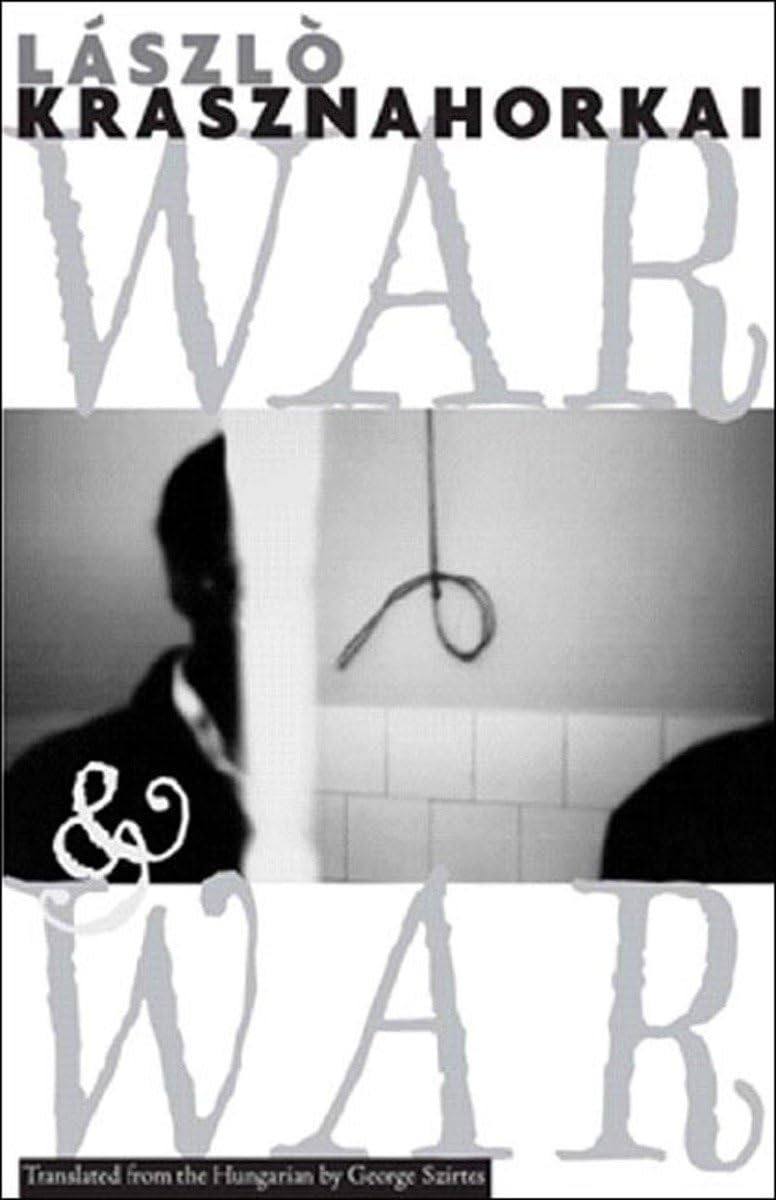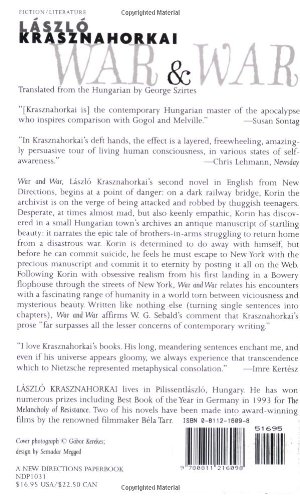Deliver to DESERTCART.NL
IFor best experience Get the App




Full description not available
M**L
A Labyrinth of Words
This novel is Krasznahorkai's masterpiece.Krasznahorkai's writing feels ancient. He is an primeval architect of narrative, of perspective, of vast sentences...There are rarely, if ever, direct experiences-- someone, usually Korin, the protagonist, but often the people he runs into, is always speaking to someone else about something that just happened to them. Usually the people he encounters are talking to their friends or husbands or girlfriends a couple days later about how crazy, pathetic, or strangely irresistible Korin ends up being as he spouts his entire story time and again.There's a great melancholy in the story, too, as most people he speaks to, for pages and hours on end, don't understand a word he is saying as he is trying to communicate his grand realization about the march of history.Of all the indirecty recounted stories, the one that is most captivating is that of the manuscript he finds, which narrates a story as mysterious, yet strangely irresistible as the larger novel. In fact, much of how Korin describes the manuscript actually describes the novel as a whole.All that said, this book is not for everyone. It's not light beach reading; it will require the whole of your attention. It's not a book you read in one sitting, or at least it shouldn't be... You will have to take time to think in between sections (each section being one sentence long, with sentence lengths ranging from two lines to seven pages) and chapters. It's not just a narrative-- Krasznahorkai is grappling with some major ideas here.This book is a future classic. This book is a labyrinth.It's maddening, it's heartbreaking, and it's beautiful.
C**R
the fool's quest
korin loses his mind while contemplating infinite worlds and believes he is about to literally lose his head. surrounded by a circle group of seven squatting child killers, ages eleven to fourteen, having recently been mugged, beaten, by the same children listening to him, korin spins an ongoing spiel. the start of a grim tale of tales within a tale, an infinity of survival tale. korin is an archivist at a records bureau, until he drops out of his life, rids himself of material possessions and sets out for new york, the place he decides is the center of the world, the place he can lose his life.like prometheus, he has stolen something he believes important to humanity. korin, having read robert graves, identifies with hermes more than the thieving prometheus. korin’s flight, or quest, is also inspired by robert graves. korin carries with him a stolen manuscript, sewn in the lining of his coat.in the united states, in new york city, holed up in the apartment of a lowlife hungarian immigrant, korin transcribes the pilfered manuscript to the internet while sharing the story daily with the abused and terrified puerto rican wife of the apartment owner, living illegally in the u.s. the tale in the manuscript, actually four tales, proceeds by starts and stops, not so much like the storyteller scheherazade, but scheherazade as reimagined by the underappreciated novelist and short story writer, john barth. the stolen manuscript, smuggled to the usa, is to become part of eternity, in the only form of the eternal as we know it, the internet, another nod to a barth novel, see the computer in Giles-Goat Boy.the manuscript is a marvelous account of four travelers and a mysterious stranger who show up at different bustling world centers during the middle ages, told with all the dazzling details of italio calvino and marco polo.the new york sequence of War & War, followed by a sequence in switzerland, are like nothing krasznahorkai has provided in the other three novels of his quartet—concrete avenues, skyscrapers and biographies of their architects, east village and the upper east side. far away from his hungarian trains are the interiors of airplane terminals. for a moment, struck by the city’s persona, one roots for korin, hoping bright lights usher in the rockettes, gershwin’s Rhapsody in Blue plays while korin jauntily strolls down the avenues in tune to the life force. but that’s not gonna happen, the loving nostalgia mixed with the apathy of paul auster’s new york wanderers notwithstanding, this is a lazslo krasznahorkai novel, and korin, true to the cyclical pattern of the quest novel, must return to dismal, gray, lifeless hungary to meet his fate. but what a wonderful interlude from the other three novels.
V**N
The technique and erudition of this author are like none I've read before
Krasznahorkai is a writer of remarkable skill, as is the translator, George Szirtes. As you might glean from other reviews, the novel concerns a present day character called Korin, who finds a manuscript that shifts among various historical times and places. Unlike some writers who use chapter breaks or italics to signal shifts between time and place, Krasznahorkai subtly glides from present day New York to bronze age Greece or fifteenth century Cologne without you even realizing it until you're there, much as Korin does in his altered mental state. The technique and erudition of this author are like none I've read before.
Trustpilot
1 day ago
1 week ago